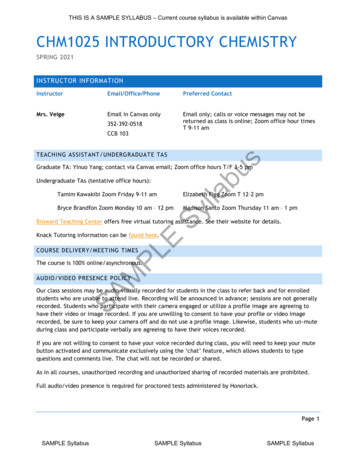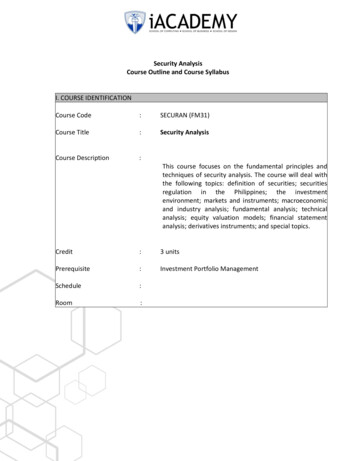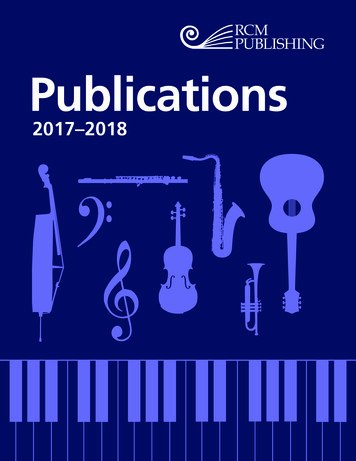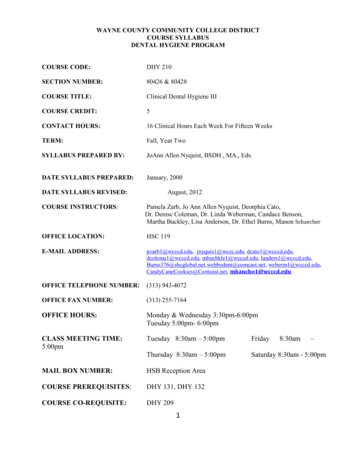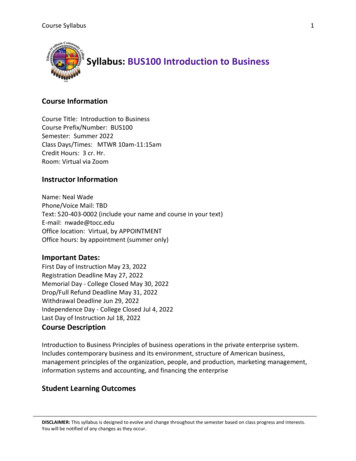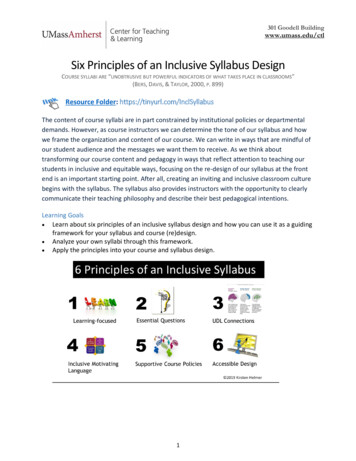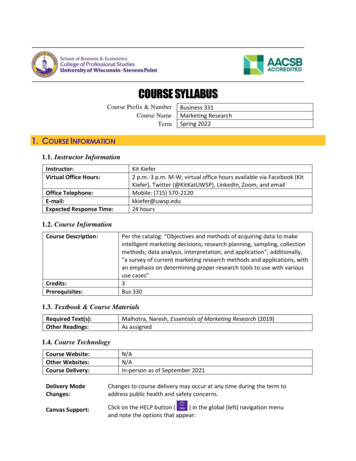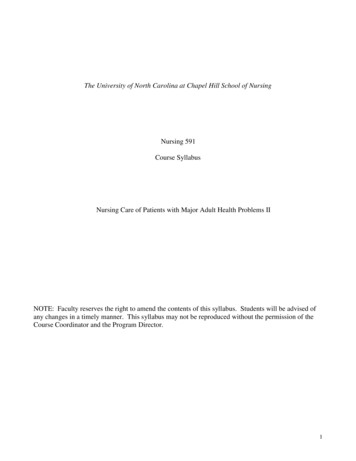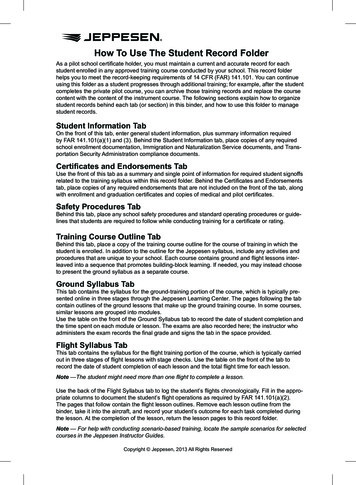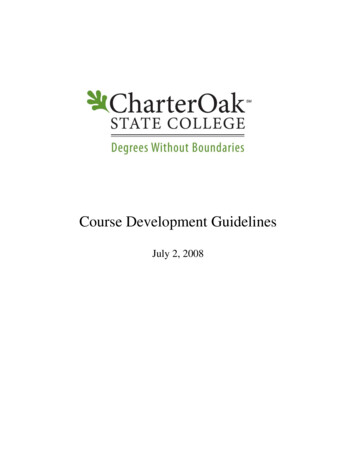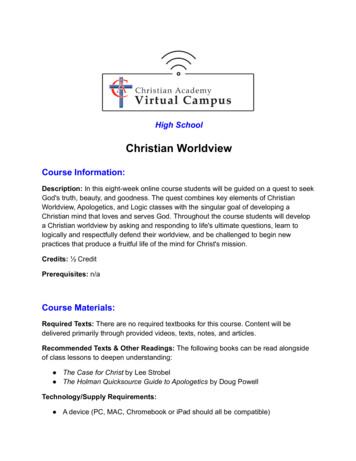
Transcription
High SchoolChristian WorldviewCourse Information:Description: In this eight-week online course students will be guided on a quest to seekGod's truth, beauty, and goodness. The quest combines key elements of ChristianWorldview, Apologetics, and Logic classes with the singular goal of developing aChristian mind that loves and serves God. Throughout the course students will developa Christian worldview by asking and responding to life's ultimate questions, learn tologically and respectfully defend their worldview, and be challenged to begin newpractices that produce a fruitful life of the mind for Christ's mission.Credits: ½ CreditPrerequisites: n/aCourse Materials:Required Texts: There are no required textbooks for this course. Content will bedelivered primarily through provided videos, texts, notes, and articles.Recommended Texts & Other Readings: The following books can be read alongsideof class lessons to deepen understanding: The Case for Christ by Lee Strobel The Holman Quicksource Guide to Apologetics by Doug PowellTechnology/Supply Requirements: A device (PC, MAC, Chromebook or iPad should all be compatible)
Internet/Wi-Fi Connection and a stable internet connection (at least 10Mbpsdownload and 10Mbps upload) dedicated to each student device. For bestperformance, where possible, use a wired connection to the router (not Wi-Fi). Students must be able to maintain strong internet connection for weekly onlinemeetings that can last from 1 hour to 1.15 hours long. General school suppliesOnline Meeting Attendance and Standards: Attendance to scheduled weekly online meetings is a vital part of this course andis therefore considered mandatory. A weekly engagement/participation grade willbe accessed. If you are going to be absent, notify the teacher ahead of time. You areconsidered absent from class if you miss more than 20 minutes. More than three(3) absences will result in failure of the class without refund. An absence will result in a zero for any engagement or participation grade. Be on time to class. Arriving two (2) minutes past the scheduled time isconsidered late and can result in loss of engagement/participation points. Wear appropriate clothing. Choose an area that is free from distractions (other people, pets, noises, etc.) Turn off music, television, etc. Sit up straight. Your camera must be on with your full face visible at all times. Participate fully in discussions and activities. Be respectful when the teacher or other students are speaking. Failure to comply with the online meeting standards (for example, not havingyour face visible and on camera) will result in loss of points for your weeklyengagement/participation grade.Grading PoliciesGrades are displayed to the .01 of a point and not rounded up to the next number.Grades in all subjects are letter grades based on the following scale and GPA points areassigned in the following manner.High School Grading ScaleGrade%Unweighted
A 97-1004.0A93-964.0A-90-923.7B 87-893.3B83-863.0B-80-822.7C 77-792.3C73-762.0C-70-721.7D 67-691.3D63-661.0D-60-621.0FBelow 600.0AssessmentsYour final grade will consist of five types of assessments.1. Weekly Engagement: A grade will be accessed for each weekly online meeting.The grade will be based on attendance, compliance with meeting standards(above) and participation. The purpose of this assessment is to encourage a highlevel of student attendance, engagement, and contribution at the weekly onlinemeetings.2. Quizzes: Each module will contain 1-2 quizzes. The quizzes will primarily consistof multiple choice questions covering the content topics of the module. Studentscan retake the quiz as many times as desired, but will not be able to moveforward in the module without scoring at least an 80%. The purpose of thisassessment is to help students review the key concepts and terms of the moduleand measure their basic comprehension of it.3. Discussion Board: Each week students will be required to respond to a set ofquestions through a discussion board post. Then the student must comment onat least two different student posts. Student posts are due by Friday of that week.
Comments are due by Monday of the following week. The purpose of thisassessment is to connect key content with other modules/ideas, apply thecontent to life, and build community.4. Learning Activities: Each week students will be required to complete 1-2learning activities around applying the content learned. Activities can be questionresponses, the creation of videos, images, presentations, projects etc. Thelearning activities will be due by Saturday of that week. The purpose of thisassessment is to deepen comprehension and understanding of the week’scontent.5. Final Project: In the final weeks of the course, a final project will be introduced.It will be worth no more than 10% of the final grade. The purpose of thisassessment is to provide the student an opportunity to demonstrate their learningby comprehensively putting together the key topics and content in a creativeproduct.Late & Resubmission PoliciesLate Submissions: Students are expected to manage their time and workload tocomplete all assignments on time. Should assessments be turned in late, the policy willbe to lose 10% for each day late.Resubmissions: Students are expected to turn-in their best work on their firstsubmission. Due to the short length of the course, re-submissions are not allowed onany assessment except for the quiz; which can be taken as many times as needed.However, the teacher retains the discretion to allow resubmission on other assessmentsdue to extreme circumstances.Student Integrity PolicyWhen taking a test or doing work from home, it is expected that students will not utilizeinformation from any unapproved sources, including information gained from electronicsearches or other people: Cheating is deceit or dishonesty in an academic assignment.It includes: Using materials or sources that are not allowed, or assisting others in doing soGiving or receiving help when it is supposed to be individual workUsing notes or electronic media to look up answersInappropriate use of an online translator for foreign language classes
Plagiarism: Using someone else's words or ideas in your work without properacknowledgement and documentation. Examples include: copying or sharinganswers; Having another person do the work for you; Starting with someoneelse’s work and modifying words or phrases to avoid citation; copying materialswords, or ideas from a source without proper acknowledgement and the use ofquotation marks; Paraphrasing materials, words, or ideas from a source withoutusing proper citation; copying or purchasing work from somewhere else.Any violation of student integrity on any assessment type will result in a zero. Studentswill be allowed to resubmit the assignment (or an appropriate alternative). The teacherwill grade the assignment and will give the student 60% if the score. Any subsequentincident will be considered a major violation and result in a failure for the class without arefund. Note that both the taking of and the giving of answers are considered cheatingand both will result in disciplinary action.Course OutlineWeek 1 - Module 1: The Christian Mind Topic 1 :Seek Truth, Beauty, andGoodness Topic 2: Develop and Defend YourWorldview Topic 3: Devote Your Thought Life Quiz Discussion Board Learning Activities Discussion BoardLearning ActivitiesWeek 4 - Module 3: Reality Topic 3: Arguments from Revelation Topic 4: Argument from Reason Quiz Discussion Board Learning ActivitiesWeek 2 - Module 2: Truth Topic 1: What is Truth? Topic 2: The Five Sources ofEvidence Topic 3: Truth & Worldviews Quiz Discussion Board Learning ActivitiesWeek 5 - Module 4: Origins Topic 1: The Big Bang Topic 2: Kalam & Fine-TuningArgument Topic 3: Evolution Quiz Discussion Board Learning ActivitiesWeek 3 - Module 3: Reality Topic 1: Apologetic Discussions,Debate, & Doubt Topic 2: Arguments from Experience QuizWeek 6 - Module 4: Origins Topic 4: Critiques of Evolution Topic 5: Genesis 1 Topic 6: Conclusions on Origins Quiz
Discussion BoardLearning ActivitiesWeek 7 - Module 5: Meaning & Morality Topic 1: Wisdom Topic 2: Nihilism & SecularHumanism Topic 3: Images of God Topic 4: Argument from Morality Quiz Discussion BoardLearning ActivitiesWeek 8 - Module 6: Destiny & Wrap-Up Topic 1: Atheist View of Destiny Topic 2: Christian View of Destiny Quiz Discussion Board Final Project Wrap-Up & Extra ResourcesEssential Questions & StandardsEssential Questions: How should our minds be used to love God and others? Are there good reasons to put my faith in God?Standards: Gospel & Theology The student will demonstrate an understanding of the nature and role of anImage of God in the gospel story. The student will demonstrate an understanding of the Triune nature of God. The student will demonstrate an understanding of the historical evidence for theresurrection of Jesus Christ. The student will demonstrate an understanding of God as the creator, ruler, andsustainer of all creation. The student will demonstrate an understanding of the contemporary Christianviews of creation: Young Earth Creationism, Progressive Creationism,Evolutionary Creationism. The student will demonstrate an understanding of how God designed nature,animals, and humans for specific roles and relationships within His creation. The student will demonstrate an understanding of end times: Christ’s return,heaven, hell, and new creation. The student will demonstrate an understanding of the contemporary Christianviews of hell: traditional, conditional immortality, and universalism. The Bible The student will demonstrate an understanding of the reasons the Bible istrustworthy in its formation and all that it teaches. The student will develop an understanding for the biblical genre of wisdom. Philosophy & Worldview The student will demonstrate an understanding of the nature of truth: absolute vs.relative, objective vs. subjective.
The student will demonstrate an understanding of how truth can be known.The student will demonstrate an understanding of the basic principles of logic:law of noncontradiction, fallacies, arguments. The student will demonstrate an understanding of how the truth, beauty, andgoodness of the Gospel story guides an active, disciplined, and fruitful Christianmind. The student will demonstrate an understanding of the nature of a worldview andthe role it plays in an active, disciplined, and fruitful Christian mind. The student will demonstrate an understanding of the nature of Christianapologetics and the role it plays in an active, disciplined, and fruitful Christianmind. The student will demonstrate an understanding of life’s ultimate questions. The student will demonstrate an understanding of the major difference betweenthe Christian Atheist answers to ultimate questions. The student will demonstrate an understanding of major Christian apologeticarguments for faith in God.Spiritual Formation The student will develop the skill of an active, disciplined, and fruitful mind. The student will develop the skill of reasonably and respectfully discussing anddebating faith and worldview with others.Intellectual PropertyYour participation in Christian Academy Virtual or any of its programs or courses is provided byChristian Academy employees using curriculum that is proprietary and exclusive to ChristianAcademy. By your student’s enrollment in this program/course, you acknowledge that:A. Your student’s engagement with this curriculum is for their participation and educationexclusively, and your student’s access to this material will not be shared with or used byother participants; andB. The course, classwork, or materials will not be copied and or distributed in any waywithout the express and written consent of an authorized Christian Academyemployee/agent.Violation of either sections (a) or (b) above may result in corrective action up to and includingremoval of your student from Christian Academy Virtual and/or all legal remedies available inlaw and equity including injunctive relief, monetary damages, and attorney’s fees.
Christian Worldview Course Information: Description: In this eight-week online course students will be guided on a quest to seek God's truth, beauty, and goodness. The quest combines key elements of Christian Worldview, Apologetics, and Logic classes with the singular goal of developing a Christian mind that loves and serves God.

